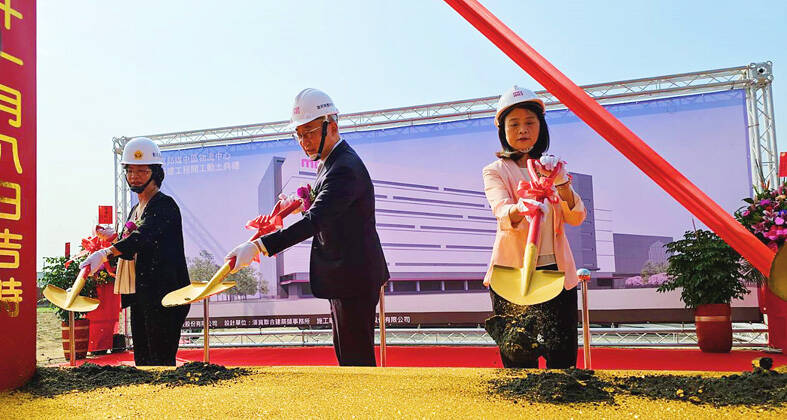Momo.com Inc (富邦媒體) yesterday broke ground for an automated logistics center in Changhua County’s Homei Township (和美) to assist the e-commerce operator in meeting its storage needs for fast delivery.
Construction of the logistics center is expected to be completed in 2027, which would help shorten the lead time for packages delivered to consumers in central Taiwan, the company said in a statement.
Upon completion, the Changhua center would be the company’s largest and most advanced logistics center in the nation, compared with its northern center in Taoyuan’s Dayuan District (大園) and southern center in Tainan’s Sinshih District (新市).

Photo: Liu Hsiao-hsin, Taipei Times
The construction site covers 9,800 ping (32,397m2), Momo said.
The company plans to build eight floors above ground and two below, investing a total of about NT$7.6 billion (US$235.67 million) in the logistics center, it said.
Central Taiwan accounts for 25 percent of Momo’s orders in Taiwan, the company said, adding that the new Changhua center is expected to process 250,000 packages per day and be able to store 5.4 million packages.
Apart from ensuring quality, speedy service for consumers in central Taiwan, the new investment is also expected to help reduce the number of deliveries and lower carbon emissions in the region, it said.
Momo, which operates three platforms — online shopping, TV home shopping and catalog shopping — has benefited from its greater logistics efficiency and a wider range of product diversity compared with local peers, with its third-quarter revenue hitting a record high NT$25.07 billion, the company reported on Tuesday.
Net profit was NT$749.86 million in the July-to-September quarter, lower than NT$842.55 million a quarter earlier and NT$756.36 million a year earlier, due to one-time asset impairment charges, the company said.
Earnings per share were NT$3.12 in the third quarter, it said.
Thanks to improving operational efficiency and economies of scale, net profit in the first three quarters of the year grew 2.8 percent year-on-year to NT$2.48 billion, with earnings per share rising from NT$10.04 to NT$10.32.
Revenue in the first three quarters hit a record NT$76.41 billion, as sales of cosmetics, healthcare, sports and leisure products maintained double-digit percentage growth from a year earlier, whereas consumer electronics and household items saw slower sales growth due to a high comparison base last year.

The US dollar was trading at NT$29.7 at 10am today on the Taipei Foreign Exchange, as the New Taiwan dollar gained NT$1.364 from the previous close last week. The NT dollar continued to rise today, after surging 3.07 percent on Friday. After opening at NT$30.91, the NT dollar gained more than NT$1 in just 15 minutes, briefly passing the NT$30 mark. Before the US Department of the Treasury's semi-annual currency report came out, expectations that the NT dollar would keep rising were already building. The NT dollar on Friday closed at NT$31.064, up by NT$0.953 — a 3.07 percent single-day gain. Today,

‘SHORT TERM’: The local currency would likely remain strong in the near term, driven by anticipated US trade pressure, capital inflows and expectations of a US Fed rate cut The US dollar is expected to fall below NT$30 in the near term, as traders anticipate increased pressure from Washington for Taiwan to allow the New Taiwan dollar to appreciate, Cathay United Bank (國泰世華銀行) chief economist Lin Chi-chao (林啟超) said. Following a sharp drop in the greenback against the NT dollar on Friday, Lin told the Central News Agency that the local currency is likely to remain strong in the short term, driven in part by market psychology surrounding anticipated US policy pressure. On Friday, the US dollar fell NT$0.953, or 3.07 percent, closing at NT$31.064 — its lowest level since Jan.

The New Taiwan dollar and Taiwanese stocks surged on signs that trade tensions between the world’s top two economies might start easing and as US tech earnings boosted the outlook of the nation’s semiconductor exports. The NT dollar strengthened as much as 3.8 percent versus the US dollar to 30.815, the biggest intraday gain since January 2011, closing at NT$31.064. The benchmark TAIEX jumped 2.73 percent to outperform the region’s equity gauges. Outlook for global trade improved after China said it is assessing possible trade talks with the US, providing a boost for the nation’s currency and shares. As the NT dollar

The Financial Supervisory Commission (FSC) yesterday met with some of the nation’s largest insurance companies as a skyrocketing New Taiwan dollar piles pressure on their hundreds of billions of dollars in US bond investments. The commission has asked some life insurance firms, among the biggest Asian holders of US debt, to discuss how the rapidly strengthening NT dollar has impacted their operations, people familiar with the matter said. The meeting took place as the NT dollar jumped as much as 5 percent yesterday, its biggest intraday gain in more than three decades. The local currency surged as exporters rushed to